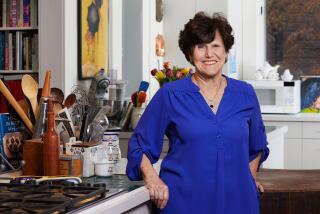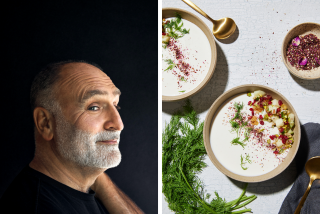Anya Von Bremzen on her memoir of eating behind the Iron Curtain
Anya Von Bremzen makes her living writing about some of the most wondrous food in the world. It’s a remarkable career for a woman born in 1963 Moscow, an era of bread lines and making do.
Her new book, “Mastering the Art of Soviet Cooking: A Memoir of Food and Longing” (Crown, $26), turns a bittersweet eye and an intelligent heart on Soviet history through food. It’s her own history and her mother’s, beautifully told.
Von Bremzen, now a resident of New York and the author of five cookbooks, talked about the book with The Times.
You talk about this as a story of longing as much as it is a story about food.
The book is as much about not having food as it is about feasting. We fantasized about everything related to food from the prerevolutionary cuisine of Chekhov and Gogol and Tolstoy, which we read about … but we couldn’t really taste because all the ingredients were gone.
And it’s a lot about my mother fantasizing about foreign cuisines that again she read about in Proust or in Hemingway and she concocted these dishes, calling them, you know, pot au feu or pizza or whatever. ... We had no idea what they were but just saying these foreign words filled us with longing and yearning. It’s about being stuck behind the Iron Curtain and having this wanderlust and this wild curiosity.
It’s what I called the poison madeleine factor. You can’t separate the politics from these idealized childhood memories. Our country had a traumatic, difficult history and a lot of it was connected with the food… Everything we ate was produced by this horrible state that we fled. That kind of adds a layer of richness and complexity. … What we really missed is the Mikoyan kotlyeti [a factory-made meat patty]. We used to buy them, they cost 6 kopeks apiece, they were so industrial. It’s like a White Castle hamburger. You can’t do it at home.
Could you talk about bread? Russian bread is very famous, and the bread lines were very famous. Now here you see a loaf of bread for $10.
You should go to a fancy shop in Moscow. It’s $12. Eric Kayser [a renowned French baker] opened a franchise in Moscow. … Everyone is into comparing the baguettes and the croissants like they do in London. And the normal Soviet-style bakers have completely disappeared from the center of Moscow...
Under Khrushchev, the year that I was born, there was a grain failure and Khrushchev tried to raise food prices.... And it was really disastrous for him politically and the Brezhnev government vowed to keep at least bread prices unchanged. … The one thing you have to give people who have been through World War II, a million people died in the siege of Leningrad, you have to give them stable bread prices.
During perestroika, when everything disappeared, people dried their own rusks. I remember my father’s radiator in 1990. It was like a rusk-drying factory.
That’s the first thing that immigrants started doing [in the U.S.] was opening commercial bakeries for the Russian-style bread, because that’s what people missed the most. When we emigrated, it was the mid-‘70s, so imagine the kind of bread you got in America, it was Wonder Bread, it was a total shock.
Can you talk about why you like Nikolai Gogol so much?
Gogol is so funny and dark and absurd. And you can read it now and it still reads completely fresh... And the tradition continues in Bulgakov’s “Master and Margarita,” which is an homage to Gogol. As a child, my mother read me the Ukrainian tales. ... The descriptions of food are so copious and so meticulous. He was obsessed with food; he churned his own butter while he traveled. And then he died by refusing to eat, which is a very Russian irony.
Did you worry about taking your book title from such a giant as Julia Child?
It was so clearly ironic. The whole idea of mastering is very Soviet. We are masters of the universe, masters of industrialization.... Also the idea of Soviet cooking is oxymoronic. So the whole thing is a send-up.
Mary.macvean@latimes.com
ALSO:
Apple moves to let authors sign e-books on the iPad
Chekhov, Dostoevsky and Tolstoy: Russia’s sex educators?
Eric Schlosser’s ‘Command and Control’ probes safety of nukes
More to Read
Sign up for our Book Club newsletter
Get the latest news, events and more from the Los Angeles Times Book Club, and help us get L.A. reading and talking.
You may occasionally receive promotional content from the Los Angeles Times.







